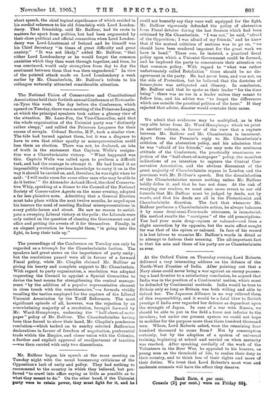Mr. Balfour began his speech at the mass meeting on
Tuesday night with the usual boomerang criticisms of the Opposition's lack of unity and policy. They had nothing to recommend to the country in which they believed, but pre- ferred "to crawl into office saying as little as possible as to what they meant to do." On the other hand, if the Unionist party were to retain power, they must fight for it and he could not honestly say they were well equipped for the fight. Mr. Balfour vigorously defended the polioy of abstention from Fiscal debates during the last Session which had been criticised by Ma Chamberlain. "I was not," he said, "afraid of the Opposition; I was afraid of my friends," and he knew that if the mutual criticism of sections was to go on, "we should have been rendered impotent for the great work we have in band." There was, he insisted, a practical fiscal policy upon which a Unionist Government could be formed, and he implored the party to concentrate their attention on that common policy. With regard to "what was rather unfortunately called Retaliation" there should be no dis- agreement in the party. He had never been, and was not, on the side of Protection, but he believed that the doctrine of laissez-faire was antiquated and illusory. In conclusion, Mr. Balfour said that he spoke as their leader "for the time being " : there was no use in a leader unless they meant to follow him, and his advice was "to forget the differences which are outside the practical politics of the hour." If they rejected that advice, disaster would overtake their cause.


































































 Previous page
Previous page